In today’s digital world, securing your online banking transactions is of paramount importance. While internet banking companies take measures to protect their servers, there are also steps you can take to increase your own security.
Use 128-bit encryption: Make sure your web browser has the latest version with 128-bit encryption, which ensures that your information is encrypted as it travels between your computer and the bank’s secure server.
Create a strong username and password: Follow the specific rules provided by your bank for creating a username and password. Choose something that is not easily guessable, and consider using a combination of letters (both uppercase and lowercase), numbers, and special characters. Avoid using easily identifiable information, such as your birthdate or pet’s name.
Change your password frequently and memorize it: Memorize your password and avoid writing it down on paper. Change your internet banking password regularly, and never share it with anyone, even if you trust them. Keep your password confidential to maintain maximum security.
Use a unique password: Base your password on something you know or like, but avoid using common phrases or easily guessable information. Consider using the first letters of words in a phrase or song, and mix it with uppercase letters, numbers, and special characters to create a strong and memorable password.
Log off after each session: Always log off from your internet banking account when you finish your transactions, especially if you are using a public computer. Avoid using public computers for internet banking as much as possible, as they may pose security risks.
Protect your screen and keyboard: When using your computer in public, make sure no one can see your screen or keyboard while you are doing internet banking transactions. Avoid setting up your laptop in crowded or insecure areas.
Be cautious with public computers: If you must use a public computer, choose internet banking companies that offer a special service to prevent your transactions from being stored in the computer’s cache memory. This adds an extra layer of security.
Take responsibility for your online security: Remember that you are responsible for protecting your personal information when doing internet banking. Stay vigilant, follow best practices, and be cautious with your online activities.
By following these tips, you can significantly enhance your internet banking security and reduce the risk of unauthorized access to your accounts. Protecting your personal information should be a top priority when conducting online financial transactions.

